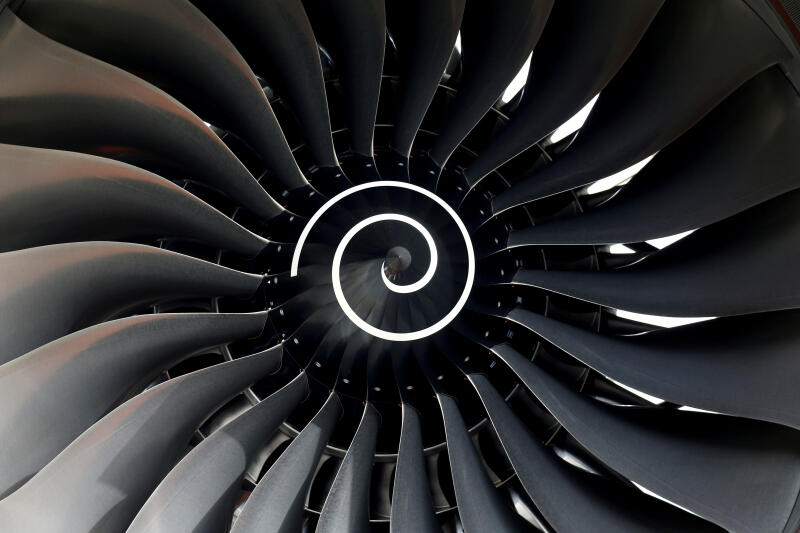Rolls-Royce to consolidate fan blade manufacturing in Singapore
Sign up now: Get ST's newsletters delivered to your inbox

Singapore is currently the only country outside Britain where Rolls-Royce manufactures its hollow titanium wide chord fan blades.
PHOTO: REUTERS
SINGAPORE - British jet engine-maker Rolls-Royce will manufacture its wide chord fan blades entirely in Singapore and move some operations back to Britain as part of the aerospace giant's consolidation plans amid the Covid-19 pandemic.
The Republic is currently the only country outside Britain where Rolls-Royce manufactures its hollow titanium wide chord fan blades, used to propel the Trent aero engines on models such as the Airbus A-380 and Boeing 787 Dreamliner.
From next year, it will begin to consolidate manufacturing volume at its Singapore campus at Seletar Aerospace Park, Rolls-Royce announced on Thursday (Aug 27).
Engine assembling and testing operations will be moved back to its plant in Derby, England, said Mr Bicky Bhangu, the firm's president for South-east Asia, the Pacific and South Korea.
Rolls-Royce will seek other opportunities within its ecosystem here for the 300 or so workers in the Singapore assembly and test unit, Mr Bhangu said in a statement.
"With the expanded capabilities in both our high-value fan blade production and our maintenance, repair and overhaul joint-venture facility, we are presented with potential opportunities for our people," he said.
The company is also exploring options for the assembly and test facility to be used for "near-term aerospace growth activities".
Rolls-Royce's Singapore campus, its first Asia-based aerospace facility, was hailed as a major boost for the sector when it opened in 2012.
It employed about 1,000 people here as of early this year, but announced in July that 240 workers would be laid off as part of a global restructuring. Rolls-Royce said in May that about 9,000 jobs worldwide - nearly a fifth of its total headcount - would be slashed because of the devastating impact of the coronavirus outbreak on the aviation industry.
Mr Bhangu said the decision to consolidate was similarly driven, adding that demand for Rolls-Royce's civil aerospace products and aftermarket services has been badly affected.
On the consolidation, he said: "We believe it will deliver an operationally effective and sustainable solution for the reduced level of demand in the commercial aerospace market that is expected to take several years to recover."
The company is working with parties such as the Singapore Industrial and Services Employees' Union and the National Trades Union Congress' Employment and Employability Institute to help affected workers through the transition, Mr Bhangu said.
"We value our significant and long-term partnership with Singapore, and we remain fully committed to Singapore as a strategic hub for high-value manufacturing, research and technology, supply chain, our regional power systems business, and as the service centre for our civil aerospace customers in Asia-Pacific."
Mr Shukor Yusof, founder of aviation consultancy Endau Analytics, said the consolidation is a sign of the long-term impact that the pandemic will have on the aviation industry.
"What this says is it's beginning to affect the supply chain - it's not just aircraft makers but engine suppliers and those lower down the chain."
Rolls-Royce's Singapore plant caters to the Asia-Pacific, which was the fastest growing market before the pandemic, he noted.
The decision to focus its wide chord fan blade manufacturing in Singapore while moving engine assembling and testing operations back to the UK was likely a trade off, considering the firm's significant investment here, Mr Shukor said.
Engines assembled here are for wide-body aircraft, such as the A330neo and Boeing 787 Dreamliner.
"Those are not going to be coming onstream for the next few years since there are no more international long hauls, so there is a mismatch between the production line and activities being done in Singapore," he said.
The move by Rolls-Royce likely signals the coming of more consolidation by engine makers as well as suppliers of other aircraft components, Mr Shukor added.
"That one of the largest aerospace companies in the world is doing this underscores the deep fissures brought about by the pandemic."
Correction note: The article has been edited to reflect the correct models of aircraft the engines assembled at the Singapore plant are for. We are sorry for the error.


